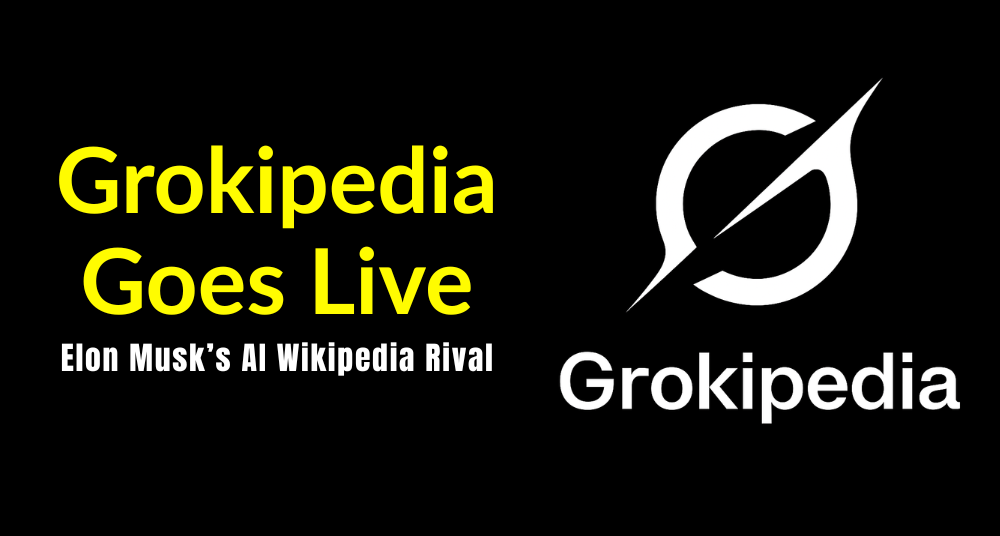In a bold move shaking the digital world’s foundation of knowledge, Elon Musk and his AI-venture xAI have officially launched Grokipedia — an AI-powered encyclopedia designed to rival the ubiquitous Wikimedia Foundation-backed Wikipedia.
Announced on his social platform, Musk declared:
“We are building Grokipedia @xAI. Will be a massive improvement over Wikipedia. Frankly, it is a necessary step towards the xAI goal of understanding the Universe.”
We are building Grokipedia @xAI.
— Elon Musk (@elonmusk) September 30, 2025
Will be a massive improvement over Wikipedia.
Frankly, it is a necessary step towards the xAI goal of understanding the Universe. https://t.co/xvSeWkpALy
With the soft launch of version v0.1 on 27 October 2025, Grokipedia already features around 885 000 articles, though many questions remain about content, credibility, and intent. This article will explore: the origins of Grokipedia, what sets it apart (and what doesn’t), why Musk is driving it, the major challenges it faces, and how it might impact knowledge-sharing and AI ecosystem in the years ahead.
The Birth of Grokipedia
Musk has had a long-standing criticism of Wikipedia, frequently describing it as biased or unreliable. In September 2025, he posted the first official notice of his new project:
“Will be a massive improvement over Wikipedia.”
The name “Grokipedia” derives from his chatbot Grok — the AI model at the heart of xAI — combined with “pedia”, indicating its encyclopedic ambition.
The public launch on 27 October 2025 came after a brief delay, and the site reportedly experienced a crash on day one due to high traffic.
What Is Grokipedia & How Does It Work?
Grokipedia is an online encyclopedia whose entries are predominantly generated or managed by the Grok AI model.
Key features:
- AI-Generated Content: Rather than human volunteers editing pages as in Wikipedia, many entries in Grokipedia are produced and reviewed by the AI system itself.
- Closed Editing Model: At launch, Grokipedia does not allow public editing of articles; users can request changes but cannot directly contribute or edit pages.
- Large Article Base (Early Days): With ~885,000 articles at v0.1, Grokipedia seeks breadth, though still behind Wikipedia’s millions of entries.
- Claimed Open Source / Free Use: Musk has stated the platform is open source and free for public use.
- Aesthetic & Interface: A minimalist homepage with search bar, dark theme, and a layout influenced by both Wikipedia and ChatGPT.
Why Musk Is Doing It?
Several motivations appear behind Musk’s decision to launch this project:
- Combatting Perceived Bias: Musk has publicly accused Wikipedia of ideological bias (labeling it “Wokipedia”) and sees Grokipedia as a “truth-seeking” alternative.
- AI Ecosystem Role: Knowledge repositories like Wikipedia are widely used to train AI models, so having an AI-native encyclopedia aligns with xAI’s strategic interests.
- Legacy & Innovation: By building a new foundation for knowledge in the age of generative AI, Musk positions xAI at the intersection of information and intelligence.
- Business & Influence: Launching a high-profile platform attracts attention, talent, and potentially commercial partnerships — especially if Grokipedia becomes influential in the AI stack.
How Grokipedia Compares to Wikipedia?
| Feature | Wikipedia | Grokipedia |
| Editing Model | Volunteer human editors; open to contributions. | AI-generated content; limited or no public editing at launch. |
| Article Count (English, ~Oct 2025) | ~7 million+ articles. | ~0.9 million articles (v0.1). |
| Governance / Transparency | Strong editorial oversight, community governance, open revision history. | Centralised by xAI / Grok model; less transparent revisions so far. |
| Content Licensing | Creative Commons BY-SA; open for reuse. | Some entries indicate adaptation from Wikipedia under CC BY-SA; open source claim. |
| Core Mission | Encyclopaedia of all human knowledge, free to use. | AI-first knowledge engine emphasising “truth”, speed, bias correction. |
In short, while Grokipedia mirrors Wikipedia in function, its underlying architecture and editorial philosophy differ sharply.
Early Reception & Criticisms
After launch, Grokipedia received a mixed reception:
- Technical Issues: The site crashed shortly after launch due to traffic.
- Content Concerns: Critics raise issues about reliability, bias, and source-independence. For example:
- Some articles appear to copy or adapt Wikipedia text very closely.
- Investigations found instances of far-right or conservative talking points embedded in certain entries — e.g., on transgender topics or historical slavery.
- Skepticism from Wikipedia Community: The Wikimedia Foundation noted that even Grokipedia needs Wikipedia as a source and that rebuilding trust and editorial community is a huge challenge.
- Bias & Accountability Risks: Scholars and media commentators worry that AI-only editorial control lacks the human nuance, diversity of voices, and oversight that volunteer communities provide.
In short: The ambition is strong; the execution and foundational credibility are still being tested.
What’s Different & What’s at Stake
Speed & Scale
AI generation allows far quicker article production compared to human editing – Grokipedia’s sub-1 million article count at launch is impressive for days in.
AI-First Editing
The model of “AI writes, AI reviews, minimal human oversight” is new at this scale for an encyclopedia.
Knowledge Pipeline
Because AI models (including Grok) feed off encyclopedic data, Grokipedia could influence not just readers but future AI systems and data-pipelines.
Information Warfare & Narrative Control
With bias concerns central, Grokipedia’s editorial slant—intentional or not—could influence public knowledge, search outcomes, and even AI training sets.
Challenge to Wikipedia’s Model
If Grokipedia succeeds, it represents a significant shift away from the volunteer-editor model to corporate/AI-managed knowledge bases.
Challenges and Risks Ahead
- Quality & Accuracy: AI hallucinations, mis-attributions, or unverified content are real risks.
- Credibility & Trust: Without a mature editorial community, oversight may lag.
- Bias & Diversity: AI models can inherit training data bias; without diverse human input, perspectives may skew.
- Licensing & Source Ethics: Many early articles appear derived from Wikipedia; legal and ethical reuse must be managed.
- Financial & Business Model: Sustaining a free‐to‐use encyclopedia requires funding; how xAI will monetise or sustain Grokipedia remains unclear.
- Competition & Adoption: Convincing users and institutions to shift from Wikipedia is hard—it’s trusted, familiar, and deeply embedded.
- Maintenance & Evolution: Encyclopedias require constant updating, corrections, community monitoring. AI generation alone may struggle with dynamism and nuance.
Potential Impacts & Future Trajectory
Short-Term: Grokipedia will remain a beta (v0.1) with limited articles; expect rapid expansion, user testing, and refinements.
Mid-Term: If successful, it could become a major alternative reference source, integrated into search engines, AI assistants, education systems, and more.
Long-Term: Could shift the paradigm of how knowledge is generated, validated, shared and consumed—potentially sparking a new era of AI-valued encyclopaedias, where human‐volunteer models coexist with AI models or are replaced.
Why This Matters for You (and the World)
- For students, researchers and educators, the credibility, editorial model and source-chain of Grokipedia will impact how information is valued and cited.
- For AI developers and technologists, Grokipedia offers a new open knowledge base and a competitive node in the AI ecosystem.
- For the public at large, it raises questions around: who controls knowledge, how trustworthy it is, and what narratives shape our collective memory.
- For policy & public interest, issues of transparency, bias, algorithmic accountability and knowledge equity come to the fore.
What’s Next for Grokipedia & xAI
- Scale Up: Expand article count far beyond initial ~0.9 million, improve depth, breadth and specialisation.
- Version Progression: Move from v0.1 to v1.0 (Musk promised version 1.0 will be “10x better”).
- Human-AI Hybrid Editing? Possibly involve more human oversight to bolster credibility and reduce bias.
- Integration with xAI/Grok: Tighter coupling with Grok chatbot, x AI tools, other Musk ecosystems (X platform, Starlink etc).
- Open Source & Community Engagement: Deliver on promises of open-source licensing, third-party contributions, transparency.
- Global Expansion & Multilingual Support: Broaden beyond English to other languages, making global knowledge more accessible.
- Business Model Clarification: How will Grokipedia be funded, monetised or sustained? Will there be premium tiers, institutional partnerships, ad-free models?
- Trust Building: Establish standards for citation, fact-checking, revision histories, community involvement to rival Wikipedia’s longstanding trust.
Final Thoughts
Grokipedia is not just another website—it is a daring experiment at the nexus of AI, knowledge, media, power and public discourse.
By launching an AI-generated encyclopedia aimed at “fixing” the world’s most popular reference site, Elon Musk and xAI have set in motion a high-stakes challenge. If Grokipedia delivers on its promise of speed, accuracy, and neutrality it could rewrite how we access and trust knowledge online. Yet the path is fraught—with bias, editorial integrity, funding, credibility and competition all in play.
Whether Grokipedia becomes a transformative force or a cautionary tale remains to be seen. For now, what matters is how the world responds: will users trust an AI-only model? Will institutions adopt it? Will it become part of the AI training backbone?
Related Blog: Macrohard by Elon Musk






What do you think?
It is nice to know your opinion. Leave a comment.